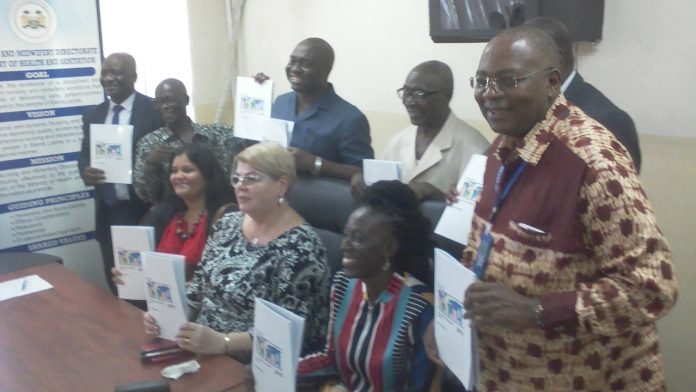By Sam Pratt
Statistician General Professor Osman Sankoh aka Mallam O of Sierra Leone Statics, says the Demographic Health Survey conducted in collaboration with the MoHS, DFID, USAID, Global Fund, World Bank, UNFPA and other stakeholders indicates that significant progress is being made in the health sector between 2018 and 2019.
At a press conference held at the conference room of the Ministry of Health on Thursday 7th November 2019 and organized by Statistics Sierra Leone, Professor Osman Sankoh the Statistician General said the Demographic Health Survey conducted in collaboration with the MoHS, DFID, USAID, Global Fund, World Bank, UNFPA and other stakeholders indicates that significant progress is being made in the health sector between 2018 and 2019.
This, he stressed, should form the basis for all planning of programs undertaken by the government and other bodies.
The 2019 Sierra Leone Demographic and Health Survey (2019 SLDHS) was implemented by Statistics Sierra Leone on behalf of the Sierra Leone Ministry of Health and Sanitation. The funding for the 2019 SLDHS was provided by the United States Agency for International Development (USAID), Global Fund, Department for International Development (DFID), United Nations Population Fund (UNFPA), World Health Organization (WHO), and the World Bank. ICF provided technical assistance through the DHS Program, a USAID-funded project that provides support and technical assistance in the implementation of population and health surveys in countries worldwide.
The government of Sierra Leone, through the Ministry of Health and Sanitation and Statistics Sierra Leone (Stats SL), together with its development partners, conducted the 2019 Sierra Leone Demographic and Health Survey (2019 SLDHS).
The SLDHS provides an opportunity to inform policy and provide data for planning, implementation, monitoring, and evaluation of national health programmes. It is designed to provide up to-date information on health indicators, including nutritional status of children, early childhood and maternal mortality, maternal and child health, fertility levels, nuptiality, sexual activity, fertility preferences, awareness and use of family planning methods, breastfeeding practices, awareness and behaviours regarding HIV/AIDS and other sexually transmitted infections, and prevalence of HIV.
The SLDHS is conducted every 5 years in Sierra Leone. The first survey was conducted in 2008 and the second in 2013. Although the next one was planned for 2018, actual data collection took place in early 2019; hence, the survey is appropriately named the 2019 SLDHS.
This report presents only preliminary results. Key findings include a decline in fertility rates and improvement in nutrition indicators, such as stunting, wasting, and underweight. Details of maternal and child health care indicators also suggest improvement.
The Government of Sierra Leone and Stats SL expressed their appreciation to all those involved in the implementation of the 2019 SLDHS in various ways, including financial and technical support.
Speaking after the presentation of the relevant data gathered in the survey, Prof. Sankoh maintained that for all the indicators surveyed, there has been significant improvement in those sectors and this is an indication that serious work has been done by the government through the MoHS to improve on- the-service delivery of the health sector. He maintained that though they were faced with challenges along the way they were able in just 6 months to conduct the said survey and come up with a credible data that can be used to inform government policies. Challenges of finance was overcome when together with their key partners they were able in a few hours to raise a little over US$1 million to fund the project and he is proud that his team were able to provide a credible data that is now the basis for all other program planning.
Admonishing media personnel to share the good news, credible data for national development recognizes the strong collaboration between his institution and its partners. He disclosed that prior to the commencement of the survey, he admonished his staff to go to the communities and ask the right questions and provide the relevant information that Stats-SL will use to produce the report.
He stressed that in their endeavour they developed a concept which they followed to the letter. For the sake of transparency, they incorporated the ICF from the USA to do the DHS so as to make the whole process internationally credible. He further made reference to the recruitment of staff at the institution when he took over, that he was adamant that those who are to be recruited as enumerators should have a first degree; a move that made him infamous, as he was accused of bringing book into play in the recruitment process. He stressed that the credibility of the data they collect demands expert handling of the questionnaire.
According to the survey, whilst there is improvement in infectious diseases, the trend is that non-communicable diseases are rearing their head. He stressed that this survey will serve government and other interested Parties to use this data to plan their respective programs. He urged Sierra Leoneans to come to Stats-SL for any data they may need.
Representatives from the UNFPA, USAID, DFID and other speakers expressed pride in being part of efforts to produce the data. They maintained that whilst there were challenges faced by the institution in gathering the data, they were able to overcome them and produce a very credible statistics, which has shown that there has been marked improvement in the health sector, especially in the maternal and child mortality ratings and other areas.
A presentation of the data was done by an ICF consultant, Ms. Deborah Collison, and the meeting was chaired by the Deputy Chief Medical Officer, Dr. Donald Bash-Taqi.




